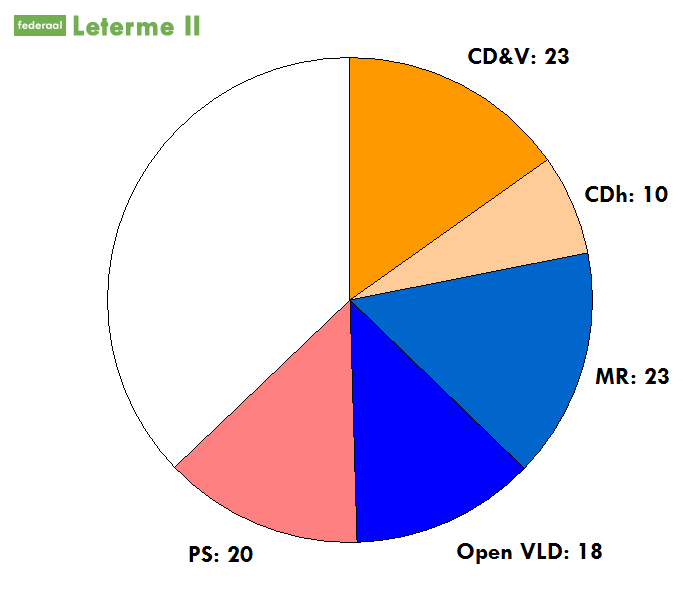Leterme II on:
[Wikipedia]
[Google]
[Amazon]
 The Leterme II Government was the
The Leterme II Government was the
 The Leterme II Government was the
The Leterme II Government was the federal government
A federation (also known as a federal state) is a political entity characterized by a union of partially self-governing provinces, states, or other regions under a central federal government (federalism). In a federation, the self-governin ...
of Belgium
Belgium, ; french: Belgique ; german: Belgien officially the Kingdom of Belgium, is a country in Northwestern Europe. The country is bordered by the Netherlands to the north, Germany to the east, Luxembourg to the southeast, France to th ...
from 25 November 2009 to 26 April 2010, and the caretaker government
A caretaker government is a temporary ''ad hoc'' government that performs some governmental duties and functions in a country until a regular government is elected or formed. Depending on specific practice, it usually consists of either randomly se ...
until 6 December 2011. It took office when the Flemish Christian Democrat Yves Leterme
Yves Camille Désiré Leterme (; born 6 October 1960 in Wervik) is a Belgian politician, a leader of the Christian Democratic and Flemish party (CD&V). He was the prime minister of Belgium, from November 2009 to December 2011.
Leterme was the ...
(CD&V
Christian Democratic and Flemish (, , CD&V) is a Flemish Christian-democratic political party in Belgium. The party has historical ties to both trade unionism ( ACV) and trade associations (UNIZO) and the Farmer's League. Until 2001, the party wa ...
) was sworn in as Prime Minister
A prime minister, premier or chief of cabinet is the head of the cabinet and the leader of the ministers in the executive branch of government, often in a parliamentary or semi-presidential system. Under those systems, a prime minister is not ...
. It followed the Van Rompuy I Government which ended when Herman Van Rompuy
Herman Achille, Count Van Rompuy (; born 31 October 1947) is a Belgian politician, who served as the prime minister of Belgium from 2008 to 2009 and then as the first permanent president of the European Council from 2009 to 2014.
A politicia ...
became the first President of the European Council
The president of the European Council is the person presiding over and driving forward the work of the European Council on the world stage. This institution comprises the college of heads of state or government of EU member states as well as t ...
. It comprised five parties: the Dutch-speaking Christian Democratic and Flemish (CD&V), the Dutch-speaking Open Flemish Liberals and Democrats (Open VLD), the French-speaking liberal Reformist Movement (MR), the French-speaking Socialist Party
Socialist Party is the name of many different political parties around the world. All of these parties claim to uphold some form of socialism, though they may have very different interpretations of what "socialism" means. Statistically, most of th ...
(PS) and the French-speaking Humanist Democratic Centre
Humanist Democratic Centre (french: Centre Démocrate Humaniste, CDH) was a Christian democratic and centrist French-speaking political party in Belgium. The party originated in the split in 1972 of the unitary Christian Social Party (PSC-CVP) w ...
(CDH).
Composition
The Leterme II Government originally comprised 15 ministers, seven secretaries of state, and a government commissary.Changes in composition
On 14 February 2011, Charles Michel resigned as minister of Development Cooperation to become Chairman of the MR. He was replaced as minister in the Leterme IIcaretaker government
A caretaker government is a temporary ''ad hoc'' government that performs some governmental duties and functions in a country until a regular government is elected or formed. Depending on specific practice, it usually consists of either randomly se ...
by secretary of state for European Affairs Olivier Chastel, who became minister of Development Cooperation and European Affairs. Chastel was not replaced as secretary of state.
Crisis
From the start of the Leterme I Government, the problem of the electoral district ofBrussels-Halle-Vilvoorde
The area within Belgium known as Brussels-Halle-Vilvoorde encompasses the bilingual— French and Dutch—Brussels-Capital Region, which coincides with the arrondissement of Brussels-Capital and the surrounding Dutch-speaking area of Halle-Vilvo ...
caused problems between the coalition partners. The Constitutional Court of Belgium
The Constitutional Court (Dutch: , french: Cour constitutionelle, german: Verfassungsgerichtshof) plays a central role within the federal Belgian state. This is a judicial court founded in 1980. Its jurisdiction was augmented in 1988 and 2003.
Hi ...
had judged in 2003 that the rules applying to the electoral district violated the non-discrimination principle. When no solution was found, the Open Flemish Liberals and Democrats quit the coalition. Leterme offered his resignation to King Albert II of Belgium on 22 April 2010. On 26 April 2010, after a final round of consultations by Didier Reynders failed, the king accepted the resignation. New elections were held on 13 June 2010. As of 26 April 2010 the Leterme II government became a caretaker government
A caretaker government is a temporary ''ad hoc'' government that performs some governmental duties and functions in a country until a regular government is elected or formed. Depending on specific practice, it usually consists of either randomly se ...
until it was succeeded by the Di Rupo I Government
The Di Rupo Government was the federal cabinet of Belgium sworn in on 6 December 2011, after a record-breaking 541 days of negotiations following the June 2010 elections. The government included social democrats ( sp.a/ PS), Christian democrats ...
.
References
{{Belgian governments Belgian governments 2009 establishments in Belgium 2010 disestablishments in Belgium Cabinets established in 2009 Cabinets disestablished in 2010